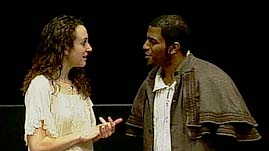Teachers' Domain - Digital Media for the Classroom and Professional Development
User: Preview



John Basil, founding member of the American Globe Theatre in New York City, directed graduate students from Penn State's School of Theatre in this production of selected scenes from William Shakespeare's Twelfth Night during Penn State's 2007 theatre season.
Jennifer Evans, Josie Gildow, and Gary Masquelier, English teachers from central Pennsylvania, wrote lesson plans based on these video segments.

In this video from Penn State's School of Theatre production of Twelfth Night, Viola and a shipwrecked crew pull themselves out of the sea onto the shore of Illyria. The captain tries to convince her there is a chance her brother survived, but Viola has little hope. The captain, a native of these lands, explains that Duke Orsino rules Illyria. Viola knows of him and recalls he's a bachelor. The captain replies that though unmarried, he is unsuccessfully courting Lady Olivia who is mourning her dead brother. Viola decides to disguise herself as a man and gain a position in Orsino’s household.
In this scene from Penn State's School of Theatre production of Twelfth Night, the action turns to Viola, the leading character in the play. Her attitude toward love appears to be in sharp contrast to that of Orsino. She is resourceful and spirited when it comes to ensuring her safety and comfort in a strange land as well as making the prospect of staying close to an eligible bachelor- Duke Orsino- real. To achieve this purpose, she dresses as a man named Cesario for most of the duration of the play. Her disguise seems to be an extension of her character, since her daring is quite unusual for a leading female character of her era. Also, when the captain speaks of Lady Olivia as the object of Orsino’s affection, Viola asks, “What’s she?” This gives the audience an indication of Viola’s opinion of other women.
She has very likely lost her brother in the shipwreck that she survived, and although she despairs at the idea, she is not overly disturbed. Instead she is pragmatic enough to think of her own well-being. She is not discouraged by the fact that the bachelor she wishes to be close to is already smitten by another lady. At best, she is ensuring a rich man for herself and at worst, a safe haven in a strange and potentially dangerous land.
A Viola is a small flower, similar to but smaller than a pansy – like a violet. Poets often use the violet/Viola metaphorically. A Viola is a flower that grows both in the shade and so close to the ground that its beauty often goes unnoticed. Since the Viola is not a flashy or showy flower, one has to be perceptive to notice its beauty; this is so very true of Viola, the character, as well. When Viola disguises herself as a male, she assumes the name “Cesario,” or “Little Caesar.” This counterfeit male is reputed to be very handsome.
Disguise has been an element in western comic theatre since ancient Greece and it continues full throttle even today. Cross-dressing takes this comic element up another significant notch. There were no female actors in Shakespeare’s day and male actors played the roles of the female characters. This required the audience to practice ‘willing suspension of disbelief’ wherein the fact that the ‘ladies’ on the stage were actually gentlemen was simply overlooked. Therefore, the idea that the man pretending to be a woman (Viola) would then go on to pretend to be a man (Cesario) was even more humorous for them!
Characterization of Viola: How do the qualities listed below introduce us to Viola’s daring character?
Her immediate lack of concern that her brother may have survived
Her first reaction to hide
Her response to attach herself to a man, particularly one she knows to be an attractive bachelor
Her quick decision to disguise herself as a man to negate that she is a woman alone
(Line 35)
What’s she?
How is this an interesting way to phrase the question? What does this say about Viola and her opinion of other women?
Discuss the practice of “Willing Suspension of Disbelief for the Moment” in the enjoyment of poetry and drama. What already seems impossible that we must accept to propel us into the plot?
 Loading Standards
Loading Standards